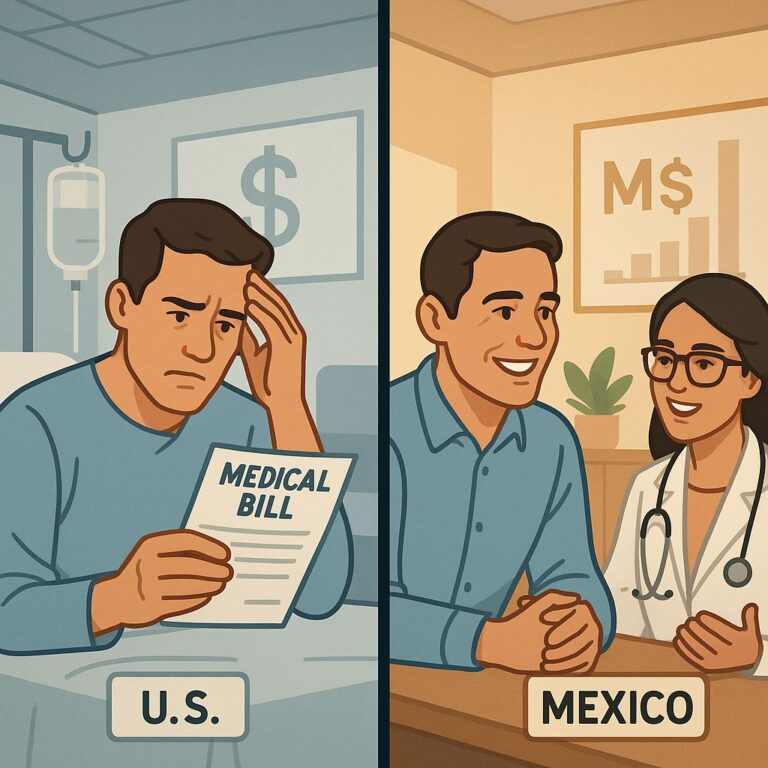Summary
Medical travel to Mexico has emerged as a prominent option for individuals seeking affordable and high-quality healthcare solutions outside their home countries. This trend is largely fueled by the significant cost savings associated with medical proce- dures in Mexico, which can be as much as 90% less than similar treatments in the United States and Canada, making it particularly attractive for uninsured patients or those with high deductibles.[1][2] Additionally, many healthcare facilities in Mexico are accredited by reputable organizations like the Joint Commission International (JCI), ensuring that international patients receive care that meets globally recognized standards of quality and safety.[3][4]
This trend is largely fueled by the significant cost savings associated with medical proce- dures in Mexico, which can be as much as 90% less than similar treatments in the United States and Canada.
Josef Woodman
In recent years, medical tourism to Mexico has gained traction across various specialties, including cosmetic surgery, dental care and orthopedic procedures, with patients drawn not only by the lower prices but also by the immediate access to healthcare services without long wait times typical of the U.S. healthcare system.[5][6] However, while many individuals report positive experiences, there are inherent risks and concerns associated with medical travel, such as potential language barriers, continuity of care issues and the varying quality of medical services across different regions.[7][8]
Despite the advantages, patients contemplating medical procedures in Mexico should conduct thorough research and be mindful of the potential complications that may arise, including infections and difficulties in post-operative care.[9][10] Understanding insurance implications and ensuring proper pre-trip preparations are essential steps to mitigate these risks and enhance the overall experience.[11][12] As medical travel continues to grow in popularity, it presents both opportunities and challenges for those seeking healthcare beyond their home borders.
Benefits of Medical Travel to Mexico
Medical travel to Mexico offers numerous advantages that make it an appealing choice for patients seeking healthcare solutions outside their home countries. These benefits range from cost savings to quality of care and accessibility.
Cost Savings
One of the primary draws of medical tourism in Mexico is the significant cost savings compared to procedures in the United States and Canada. Patients can expect to save anywhere from 40% to 90% on medical treatments, depending on the proce- dure[1][2]. For example, the average cost of coronary artery bypass graft (CABG) surgery in the U.S. ranges from $123,000 to $151,000, whereas it can be performed for approximately $27,000 in Mexico[13]. Such substantial price differences make medical travel a viable option, especially for uninsured individuals or those facing high deductibles.
Quality of Care
Many healthcare facilities in Mexico catering to international patients are accredited by the Joint Commission International (JCI), which ensures adherence to globally recognized standards of quality and safety[3]. As a result, patients can expect a high level of care in modern facilities equipped with the latest medical technology.
Additionally, private healthcare options are widely available, providing faster access to specialized services without long wait times, which are often a concern in the U.S. healthcare system[4].
Personalized Services
Navigating the complex U.S. healthcare system can be daunting, with intricate insurance terms and complicated care pathways. In contrast, Mexican healthcare providers frequently offer personalized services to international patients, assisting with travel logistics, appointments, and follow-ups, thereby simplifying the entire process[3]. This personalized approach enhances the overall experience and allows patients to focus on their health and recovery.
Immediate Access to Healthcare
Access to healthcare can be a significant issue in rural areas of the U.S., often compounded by long wait times for appointments[5][14]. Mexico, being a neighboring country with a well-established healthcare infrastructure, presents a solution to these accessibility issues. Many clinics and hospitals in border towns and popular tourist destinations are specifically geared towards serving American patients, frequently providing quicker service than is available domestically[6].
Diverse Treatment Options
Mexico is known for a wide range of medical services that attract medical tourists, including aesthetic surgery, dentistry, orthopedic surgery, and oncology[6]. The avail- ability of diverse treatment options allows patients to seek the care they need without the limitations that may exist in their home countries. For instance, both cosmetic procedures and specialized cancer treatments are commonly sought by medical travelers, with many facilities offering innovative therapies at competitive prices[15][16].
Cultural and Linguistic Considerations
Many private healthcare facilities in Mexico are accustomed to serving internation- al patients, offering bilingual staff and culturally sensitive care. This can alleviate concerns for patients who may face language barriers in their healthcare journeys, ensuring clear communication and a more comfortable experience throughout their treatment[4][17].
Planning Your Medical Trip
When planning a medical trip to Mexico, prospective medical tourists should take a series of essential steps to ensure a safe and successful experience. These steps involve thorough research, pre-travel preparations, and a focus on communication with healthcare providers.
Pre-Travel Consultation
It is crucial to consult with your healthcare provider or a travel medicine clinician at least 4–6 weeks before departure. This allows for discussions about your specific health risks and ensures that you are up-to-date on necessary vaccinations, such as hepatitis B[18][19]. You should also discuss any existing medical conditions and ensure you have an adequate supply of regular medications for the duration of your trip[19].
Research and Accreditation
Thorough research is a vital component of planning your medical trip. Look for hospitals and clinics in Mexico that have received international accreditation from
reputable organizations such as the Joint Commission International (JCI) or the Accreditation Association for Ambulatory Health Care. These accreditations indicate that the facility meets high standards of care and safety[20][21]. Utilize resources such as Patients Beyond Borders and the Medical Tourism Association to find lists of accredited facilities and patient testimonials.
Insurance and Financial Considerations
Before traveling, it is highly recommended to obtain international travel health in- surance that covers medical evacuation back to the United States, as costs for procedures are usually out-of-pocket. Some U.S. health insurance plans may cover care abroad, so it’s important to check your policy[22][17]. Furthermore, consider purchasing supplemental medical insurance to cover emergency care, particularly for trips to remote areas where medical facilities may not meet high standards[19].
Communication and Planning
Given potential language barriers, plan how you will communicate with your health- care providers in Mexico. This may involve learning basic medical terminology in Spanish or arranging for a translator[18]. Before your trip, develop a detailed treat- ment plan with cost estimates and confirm the qualifications of the clinician who will be performing your procedure[19][21]. It is also advisable to arrange pre-operative tests locally and book accommodations near your chosen medical facility to facilitate your recovery.
Follow-Up Care
Discuss the plan for follow-up care with both your U.S. healthcare provider and the Mexican clinician. Ensure you understand which services are included in the cost of the procedure, as some facilities may charge additional fees for post-operative care[19][20]. Additionally, arranging for a travel companion can provide necessary support during your recovery[21].
By adhering to these guidelines and conducting comprehensive research, medical tourists can better navigate their experience and make informed decisions about their healthcare in Mexico.
Preparing for Your Trip
When planning a medical trip to Mexico, thorough preparation is essential to ensure a smooth and safe experience. This section outlines key steps to take before your departure.
Documentation and Health Preparations
Before leaving for Mexico, confirm that you have all necessary documents, including your passport, medical records, and any required travel insurance.[23] It is advisable to check the Entry, Exit, and Visa Requirements specific to your nationality to ensure compliance with local laws.[22] Additionally, consider packing a travel health kit containing both prescription and over-the-counter medications, ensuring they are in their original packaging. Bring enough medication to last your entire trip, along with extra supplies for potential delays, and copies of all prescriptions.[18]
Researching Your Destination
Take time to familiarize yourself with your destination by reviewing travel advisories, local health information, and entry requirements.[22] Joining the Smart Traveler Enrollment Program (STEP) can also be beneficial, as it provides important alerts and updates from the U.S. embassy or consulate relevant to your location.[11]
Emergency Preparedness
Establish a contingency plan for emergencies, including noting down local emer- gency contact numbers such as 066, 060, or 080 for medical services in Mexico.[12] Leave a copy of your itinerary, contact information, and important documents with a trusted person back home, and carry the contact information for the nearest U.S. embassy or consulate.[12]
Health and Safety Considerations
To ensure your health while traveling, consult with a healthcare provider or travel medicine specialist 4–6 weeks prior to your trip for personalized advice and vaccina- tions if necessary.[4] It’s also crucial to monitor any health advisories related to your destination, particularly in light of ongoing global health concerns.[24][4] Consider your insurance coverage, especially regarding follow-up care and potential medical complications that may arise during or after your procedures.[18]
By carefully addressing these considerations, you can enhance the likelihood of a successful medical travel experience in Mexico.
The Medical Experience in Mexico
Seeking medical care in Mexico has gained popularity among patients looking for affordable and high-quality treatments. This section outlines the various aspects of the medical experience in Mexico, including the advantages, challenges, and essential considerations for those contemplating medical tourism.
Pros of Medical Care in Mexico
Cultural Experience
One of the significant advantages of seeking medical care in Mexico is the opportunity to immerse oneself in the country’s rich cultural heritage. Patients can enjoy vibrant
art and music scenes, delicious cuisine, and historical sites, making their healthcare journey not only about treatment but also about experiencing the local culture[7].
Shorter Wait Times
Mexico’s healthcare system typically offers shorter wait times for consultations, diagnostics, and procedures compared to many countries, particularly the United States. This is especially beneficial for individuals with urgent medical needs or those seeking timely treatment without extensive delays[7][25].
Cost Savings
The financial aspect of seeking medical treatment in Mexico is a compelling reason for many patients. Medical procedures, especially cosmetic surgeries and dental care, are often significantly less expensive than in the United States, making Mexico a benchmark for international medical care[25][26].
Cons of Medical Care in Mexico
Language Barriers
One of the challenges patients may face when seeking medical care in Mexico is communication. While many healthcare professionals speak English, patients who are not fluent in Spanish may encounter difficulties. Effective communication is vital for understanding treatment plans and ensuring a smooth process[7][26].
Continuity of Care
Maintaining continuity of care can be complex for patients requiring ongoing treat- ment. Coordination between healthcare providers in the home country and Mexican facilities is crucial for ensuring seamless transitions and follow-up care[7].
Insurance Coverage
Insurance coverage for treatments obtained in Mexico can vary. Some insurance policies may have restrictions regarding coverage for procedures performed outside the home country. Patients are advised to thoroughly review their insurance policies to understand their options and any potential out-of-pocket expenses[7][18].
Post-Procedure Care
Aftercare and follow-up may require additional planning, particularly for patients returning to their home country after receiving treatment. It is essential to coordinate with local healthcare providers to ensure a successful recovery and address any complications that may arise[7][18].
Popular Medical Procedures
Mexico has become a leading destination for several medical procedures, particularly in the fields of cosmetic surgery, dentistry, and orthopedic surgery. Popular treatmen- ts include plastic surgeries such as rhinoplasty and liposuction, as well as dental care services and various aesthetic procedures[25][6][13]. Patients are encouraged to consult with healthcare professionals to understand the risks and ensure they are making informed decisions about their medical care abroad[26][27].
Potential Risks and Considerations
Traveling abroad for medical care, particularly to Mexico, presents a unique set of potential risks and considerations that patients should be aware of before making a decision. While many individuals opt for medical tourism to save costs—reportedly between 50% to 70% compared to U.S. prices for elective procedures[9]—the journey comes with significant health and safety concerns.
Health Risks
One of the foremost risks associated with medical tourism is the heightened likeli- hood of infections. Medical procedures performed in foreign countries can lead to complications such as wound infections, bloodstream infections, and exposure to antimicrobial-resistant pathogens that may be more prevalent in certain regions[19]- [18]. The Centers for Disease Control and Prevention (CDC) has documented several outbreaks among medical tourists, including fungal meningitis linked to epidural anesthesia in Mexico, and various surgical site infections from cosmetic procedures in the Dominican Republic[19].
In addition to infection risks, patients must consider the complications associated with flying shortly after surgery, such as the dangers of traveling in a pressurized cabin which can affect healing[9]. Furthermore, obtaining follow-up care for any post-operative issues can be problematic when the initial procedure is performed in another country[9].
Quality of Care
Quality of care can vary significantly between medical facilities, even within a single country. In Mexico, while many world-class hospitals enforce stringent safety standards and have international accreditations, the quality can be inconsistent, particularly in coastal and resort areas[10][28]. Patients are advised to thoroughly research their options, checking for certifications and the credentials of medical personnel involved in their care. Having access to legal resources can also be crucial if complications or disputes arise during the medical travel experience[10].
Legal and Logistical Challenges
Navigating the logistics of medical travel can be daunting. Patients must ensure they have comprehensive travel insurance that covers medical care abroad, including medical evacuation if necessary[11]. Additionally, the complexity of legal frameworks governing healthcare in foreign countries means that travelers should be prepared for the potential of unexpected legal issues during their trip[10].
Pre-Trip Preparation
To mitigate these risks, informed travelers are better equipped to make safe deci- sions. It is crucial to engage in thorough pre-trip research about health concerns specific to the destination, as well as to consult reliable resources such as the CDC and the U.S. Department of State[10]. Having a contingency plan for emergencies, understanding local healthcare capabilities, and being up-to-date on vaccinations are all important steps to ensure a safer medical travel experience[11][12].
Common Concerns and Misconceptions
Quality of Care in Mexico
One of the prevalent misconceptions about seeking medical care in Mexico is that the quality of treatment is inferior compared to that in the United States. However, many Mexican healthcare facilities, especially those that cater to international patients, are accredited by the Joint Commission International (JCI), which ensures adherence to globally recognized standards of quality and safety[3][29][28]. This accreditation is a significant indicator of the level of care provided in these institutions, countering the belief that care is inherently substandard in foreign countries.
Navigating the Healthcare System
The complexity of the U.S. healthcare system often leaves patients feeling over- whelmed by intricate insurance terms and complicated care pathways. In contrast, healthcare providers in Mexico frequently offer personalized services to international patients, simplifying the process by assisting with travel logistics, appointments, and follow-ups[3][16]. This support can make the experience less daunting and more efficient for patients traveling for medical procedures.
Safety and Complications
While many people travel to Mexico for medical procedures due to factors like afford- ability and accessibility, concerns about safety and the potential for complications exist. Experts caution that patients must consider the implications of traveling with medical conditions, as the complexities of travel can impact health outcomes[8][11]. Additionally, complications can arise from medical tourism, with reports of infections and botched procedures necessitating corrective surgeries once patients return to the U.S.[8][30]. Therefore, thorough research and careful consideration are essential before proceeding with medical travel.
Public vs. Private Healthcare
Another common concern involves the comparison between public and private healthcare systems in Mexico. Public healthcare services, while free, can be incon- sistent in quality, often suffering from overcrowding and limited resources[4][31]. In contrast, private healthcare offers modern facilities, shorter wait times, and a higher standard of care, making it an attractive option for many medical tourists[3][32].
However, private health insurance can entail higher upfront costs, with premiums starting around $1,000 USD annually, which patients should weigh against the benefits of quality and expedited care[4].
Personal Experiences and Testimonials
When considering medical travel to Mexico, potential patients often seek insights from those who have undergone similar experiences. Testimonials can provide valu- able perspectives on the quality of care, costs, and overall satisfaction with the procedures received.
Positive Experiences
Many patients report favorable outcomes and positive experiences during their medical tourism journeys. For instance, Jane from California traveled to Cancun for a Mommy Makeover and expressed her appreciation for the state-of-the-art facilities and the compassionate care she received[33]. Similarly, Mark from Canada shared his success story regarding weight loss surgery in Cancun, highlighting the seamless process and significant cost savings compared to procedures in his home country[33]. These testimonials emphasize not only the affordability of healthcare in Mexico but also the professionalism of the medical staff involved.
Cautionary Tales
While there are numerous success stories, it is essential to remain aware of poten- tial risks. Recent findings indicate an increase in reported infectious complications among patients who have received healthcare abroad, including in Mexico[34]. Some patients have experienced negative outcomes, such as infections or botched procedures, leading to complications that necessitate returning home for additional care[35]. Therefore, prospective medical travelers are advised to thoroughly research and vet healthcare providers to mitigate these risks.
Importance of Word-of-Mouth Recommendations
Patients are encouraged to seek endorsements from trusted individuals who have firsthand experience with medical services in Mexico. Relying on personal recom- mendations can often be more informative than online testimonials, which may not always present an accurate representation of the services provided[27]. By connecting with previous patients, individuals can gain insights into what to expect and make more informed decisions regarding their medical travel experience.
References
- : Going Over the Border // Myths and realities about medical tourism
- : A Closer Look at Medical Tourism in Latin America
- : The Top 10 Medical Tourism Specialties and Procedures
- : «Exploring Medical Tourism in Mexico as an Answer to Challenges …
- : Public vs. Private Health Insurance in Mexico
- : Medical Tourism in Mexico: Why You Should Avoid
- : Complete Guide to Medical Tourism in Mexico
- : Medical Tourism to Mexico for Healthcare
- : Health Insurance in Mexico for Expats: Private vs. Public Options …
- : Healthcare in Mexico: A guide to the Mexican healthcare system
- Mexico – Healthcare Products & Services
- : Medical Tourism: Travel to Another Country for Medical Care
- : Medical Tourism | Yellow Book – CDC
- : Mexico vs. South Korea Health Tourism Comparison – Remediest –
- : Medical Tourism in Mexico: Planning, Payment, Preparation – Mexpro
- : International Traveler’s Checklist – Travel.gov
- : A medical tourism trip to Mexico requires careful planning and …
- : Mexico International Travel Information
- : Mexico – Traveler view | Travelers’ Health – CDC (.gov)
- : Mexico | Medical Tourism
- Weighing the Pros and Cons: Exploring Medical Care in Mexico
- : Top 10 most demanded medical procedures in Mexico
- : Mexico | Yellow Book – CDC
- : 9 tips for medical tourism in Mexico
- : Medical tourism in Mexico is rising among Americans – NPR
- : Medical Care in Mexico: Some (Surprising) Risks and How …
- : Medical Tourism Mexico: Your Comprehensive Guide
- : Medical tourism: reasons, risks, and common misconceptions – WXYZ
- : Medical tourism to Mexico is on the rise, but it can come with risks
- : Little Known Fact – Mexico Adopts U.S. Hospital Accreditation …
- Why Don’t More Mexicans Have Health Coverage?
- : Unveiling Mexico’s Healthcare System: What You Need to Know?
- : Is it safe to travel to Mexico for medical tourism
- : Challenges with medical tourism – PubMed
- : Medical tourism to Mexico is on the rise, but it can come with risks




